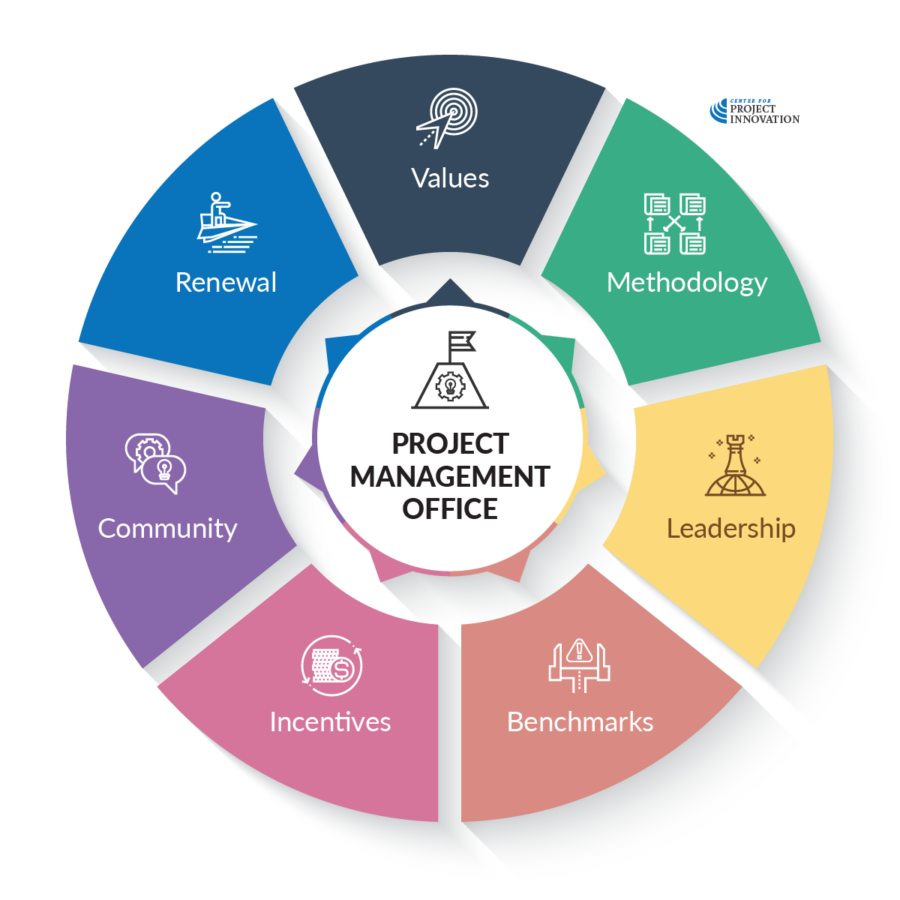Changing culture
Continually improving the delivery of projects via lessons learned is the first step towards changing the project management culture of your organisation.
So how do you create and maintain a culture of project excellence?

Values
It has been well established that the strategic objectives of the performing organization should be reflected in the opportunities realized by projects.
In the same way, the policies, principles, and values that support the execution of projects should explicitly align with the organization’s desired identity.
These might be expressed in program and portfolio-level SMART goals, codes of conduct, and ethical guidelines that respond directly to the specific challenges of project delivery.
Methodology
A methodology may not cure all project ills; however, an integrated set of processes, tools, and templates that support high project performance will go a long way toward seeing things right.
Once again, we remind you that even though turnkey methodologies and software can be readily purchased, their successful implementation depends on local contextualization and consistent (enforced) application.
Leadership
Organizational leaders must take responsibility for the culture of project delivery in their business.
This includes modeling appropriate behavior, working within the framework, and being equally accountable for success and failure.
Significantly, this responsibility should extend beyond project teams to include sponsors, steering committee members, the executive, and owners.
Tolerance
Within acceptable limits, failure should be tolerated.
Organizations that punish any deviation from the plan – especially over-budget or behind-schedule performance – hide error, discouraging learning and suppressing innovation.
It is trite to say that failure is just one step on the path to success; however, an appreciation that failure will occur is necessary for organizational growth.
Incentives
We have already discussed in this Module the importance of positive feedback, as well as systems of recognition and reward.
As long as feedback is fair and rewards are equitably shared across project teams – and success is celebrated without prejudice – individuals will be motivated to continually improve themselves and their projects.
Stories
Successful sporting franchises are famous for their superstitions, customs, and legends – how can projectized organizations leverage this?
It may be that you share the ritual of the stand-up meeting over coffee at the start of the day, or you debrief with an after-action report (AAR) following the completion of every task.
A culture of project storytelling can also reinforce desirable values and behaviors; for example, lessons learned can be published and presented in the workplace.
And, as we will see shortly, stories can also be used to exemplify what not to do!
Renewal
Project, program, and portfolio teams also need regular renewal – just jumping from project to project is not enough!
Renewal can come in the form of lessons learned, professional development (the subject of the next Topic), or new members, each with their own knowledge, skills, and experience that need to be absorbed.
You should also look to call out and sanction behavior that is hostile to the values of the group. There should always be articulated and consistently applied limits to what is tolerated.
The Project Management Office (PMO)
The beating heart of a culture of project excellence is an empowered project management office (PMO).
It is impractical for any organization large enough to justify a departmental structure to universally enjoy exceptional project capability and performance unless a single entity ‘owns’ the project space.
This includes responsibility and accountability for all the intersecting elements mentioned here and throughout this course.
Projectitis
One of the advantages of creating dedicated project teams is that participants from different areas can develop into a highly cohesive work unit that is strongly committed to the project’s success.
The flip side to this, though, is what we call projectitis, an us-versus-them attitude that can develop within organizations (we mentioned this briefly when discussing indirect project stakeholders).
The tendency to assign project teams prestige, perks, and even exotic titles, such as ‘Silver Bullets’ or ‘Tiger Teams’, can result in resentment from the rest of the organization.
This appears to have been the case with Apple’s highly successful Macintosh development team of the mid-1980s.
Steve Jobs, who at the time was both chairman of Apple and project manager for the Mac team, pampered his team with everything from at-the-desk massages, coolers stocked with freshly-squeezed juice, to first-class travel.
Jobs considered his team to be the elite of Apple and had a tendency to refer to everyone else as ‘bozos.’
Engineers from the Apple II division, which was the bread and butter of Apple sales, naturally became incensed with the special treatment their colleagues were getting.
One evening at Ely McFly’s, a local watering hole, the tensions between the two camps boiled over.
Aaron Goldberg, a long-time industry consultant, watched from his barstool as the squabbling escalated.
He says… ‘The Mac guys were screaming, “We’re the future!”
The Apple II guys were screaming, “We’re the money!”
Then there was a geek brawl – pocket protectors and pens were flying.’
Although comical from a distance, the discord between the Apple II and Mac groups severely hampered the company’s performance during that era.
John Sculley, who replaced Steve Jobs as chairman, observed that Apple had evolved into two ‘warring companies’ and, referencing the line between North and South Korea, referred to the street between the Apple II and Macintosh buildings as ‘the DMZ’.

Source: Larson & Gray
The lesson here is that project culture can be over-celebrated.
Ensure that there remains a strategic and cultural fit with the ongoing ‘business as usual’ of your organization.




